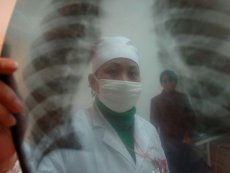Vitamin D helps to get rid of tuberculosis faster
Last reviewed: 16.10.2021

All iLive content is medically reviewed or fact checked to ensure as much factual accuracy as possible.
We have strict sourcing guidelines and only link to reputable media sites, academic research institutions and, whenever possible, medically peer reviewed studies. Note that the numbers in parentheses ([1], [2], etc.) are clickable links to these studies.
If you feel that any of our content is inaccurate, out-of-date, or otherwise questionable, please select it and press Ctrl + Enter.

Large doses of vitamin D help people with tuberculosis recover faster. To this conclusion came the British scientists. The results of their work will be published this week in the periodical "Proceedings of the National Academy of Sciences of the USA".
For many decades, even before antibiotics became a generally available way of treating tuberculosis, sunlight helped fight the disease. Therefore, patients were often recommended to travel to a sanatorium, where under the influence of sunlight the culture of mycobacterium tuberculosis perishes.
In addition, sunlight provides the body with vitamin D, which is very important for strengthening the resistance of innate immunity to microbial infection.
A team of researchers from Queen Mary University of London and the National Institute of Medical Research found that high doses of vitamin D, as a supplement to antibiotic therapy, are able to provide patients with substantial help in recovering from illness.
Sunlight, which provides the body with vitamin D, is very important for protecting the body from fungal bacterial infections. Moreover, the rays of the sun can act on skin lesions, which are common symptoms in patients with tuberculosis, it is beneficial, speeding up their healing.
"The results of these studies are extremely important for preventive and curative procedures. The use of vitamin D plays an important role in the repair of pulmonary tissues, as well as in the process of reducing the period of bacterial excretion. Its action does not interfere with the action of antibiotics. And this gives hope for the possibility of its use in relation to the treatment of other patients receiving antibacterial therapy for severe infections - sepsis and pneumonia, as well as other similar diseases, "says Dr. Adrian Martino from the Department of Respiratory Infections and Immunity at the Blizard Institute.
In the experiment, scientists involved 95 patients with tuberculosis from several London clinics.
They were divided into two groups, one of which was given supplemental vitamin D in high doses, and the second group received a placebo.
Based on the results of the study of the presence of an exciter bacterium in the sputum, it was found by microscopy that in the group of patients receiving vitamin D, the bacterium disappeared from the sputum of patients for 23 days, while in the placebo group it was 36 days.
According to scientists, it is still too early to say about the need to add high doses of vitamin D to the complex for treatment of patients with tuberculosis. However, the effect of its use in research is beyond question.
